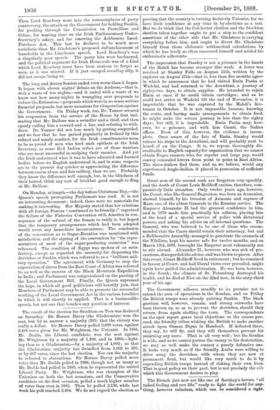On Monday, at length,—the day before Christmas Day,—the Queen's speech
proroguing Parliament was read. It is not an interesting document ; indeed, there were no materials for making it interesting. Her Majesty stated that her relations with all foreign Powers "continued to be friendly;" regretted the failure of the Fisheries Convention with America in con- sequence of the refusal of the Senate to ratify it, but hoped that the temporary arrangements which had been adopted would avert any immediate inconvenience. The conclusion of the convention as to Sugar-Bounties was mentioned with satisfaction, and the signing of the convention by "the repre- sentatives of most of the sugar-producing countries" was rehearsed. The condition of Egypt was spoken of as satis- factory, except as regarded the necessity for dispersing the dervishes at Suakin, which was referred to as a "brilliant mili- tary operation." The agreement with Germany to atop the exportation of slaves from the East Coast of Africa was referred to, as well as the success of the Black Mountain Expedition in India; and Parliament was congratulated on the passing of the Local Government Bill. Finally, the Queen expressed the hope, in which all good politicians will heartily join, that Members of Parliament may be able to promote the successful working of the Local Government Act in the various localities in which it will shortly be applied. That is a businesslike speech, but not one that touches any question of interest.


































 Previous page
Previous page